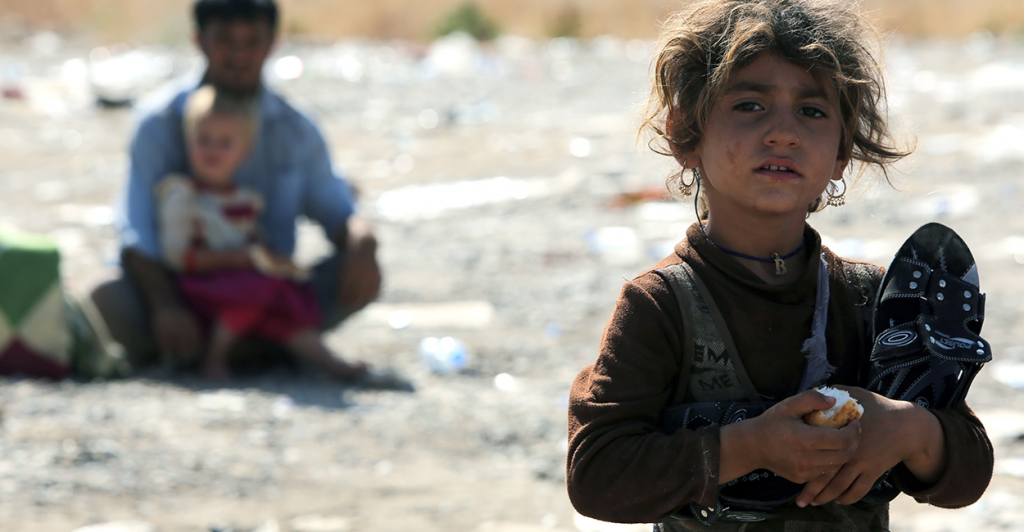‘No Future for Yezidis in Iraq’: Man Waits for Word of Loved Ones’ Safety
Josh Siegel /
The sentiment is clear, and it resonates all the way to Brampton, Canada.
“There is no future for Yezidis in Iraq,” said Mirza Ismail, speaking of the suffering religious minority to which he belongs.
Since the Islamic State terrorist group attacked his hometown in the Sinjar plain of northern Iraq on Aug. 2, forcing the Yezidis to flee from their villages to the top of a mountain, Ismail has spent his days pleading with U.S. and international officials to do more to save his people.
>>> Raw Footage From Iraq: It’s the Most Bone-Chilling Video You’ll See Today
Ismail says he barely has slept since returning to Brampton, his home since he left Iraq in 1991, after two days of meetings with Obama administration officials in Washington, D.C.
Huddled near cell phones with 15 or so Yezidi families from around the Toronto area, Ismail shares and receives information about the latest on Mount Sinjar — who’s still up there, who made it down, who was airlifted out, who will never return, who was born there.
>>> ‘Convert to Islam or Die’: Yezidi Iraqi Man Pleads for Help at White House
The situation is so dire that some women on the mountain, the group learned, had delivered babies with no medical assistance.
“It’s a very difficult time,” said Ismail, chairman of the Yezidi Human Rights Organization. “Every time you receive a phone call it’s a difficult time. Especially when you talk to a woman, and they are suffering. It’s very difficult to stay strong.”
On Friday, Ismail told The Daily Signal that his wife, Nofa Kamal, his parents, and his siblings — four brothers and six sisters — were stuck on Mount Sinjar.
Yesterday morning, Ismail, 41, received a phone call from one of his brothers, Farman, 42.
Because phone conversations are pay as you go, Ismail only got about a minute to talk.
“And then he hung up,” Ismail said. “They have to save money.”
Farman managed to tell Ismail that he had made it down the mountain, was on the way to Syria, and then hopefully, to Zakho, Iraq, a Kurdistan region a few kilometers from the border with Turkey. Farman traveled with family members and other Yezidis he befriended on the mountain.
Farman also reported that Ismail’s wife, Nofa, traveling separately with her mothers and brothers, had made it down the mountain and to the Iraq-Turkey border near Zakho. Ismail said he has not been able to speak with her to verify that.
“I hope she is OK,” he said.

A displaced Iraqi girl from the Yezidi community holds a piece of bread Aug. 11 near the Iraqi-Syrian border. (Photo: Ahmad Al-Rubaye/AFP/Getty Images/Newscom)
Mount Sinjar lies near the Syrian border. Because the path into Kurdistan from Iraq is blocked by Islamic State fighters, the Yezidis hope to make it to the safety of Kurdish-controlled territory by way of a narrow corridor through Syria.
Ismail said the entire journey takes three days.
The New York Times reports the Bajid Kandal refugee camp in northern Iraq, run by the United Nations, is hosting about 24,000 men, women, and children. Yezidis also have fled to the Nowroz refugee camp in Syria, which remains engulfed in civil war and partially in the hands of the Islamic State, formerly known as ISIS.
“That refugee camp does not have any protection and we do not know when ISIS will attack [Yezidis] there,” Ismail said.
American airstrikes over the weekend against Islamic State fighters surrounding the mountain — along with air drops of food, water, and supplies — helped Yezidi and Kurdish fighters open the escape path through Syria.
But the supplies appear to have reached few, Ismail says, because officials underestimated how many Yezidis were trapped on the mountain. At one point, he says, 300,000 Yezidis were stranded atop Mount Sinjar.
Iraqi Army helicopters have evacuated small groups of Yezidis.
Although Ismail says the Yezidis welcome the efforts, he believes stronger action is required to keep the religious minority from extinction (see sidebar).
“This is the 74th genocide against the innocent Yezidis,” Ismail said. “This [more action] is the only way we can survive in the Middle East.”

